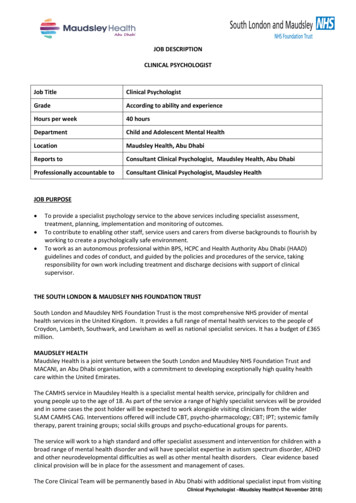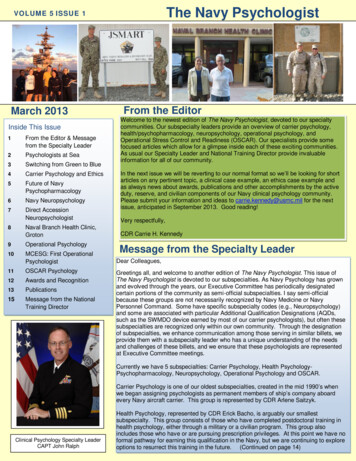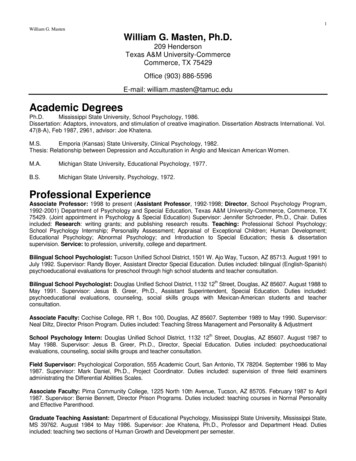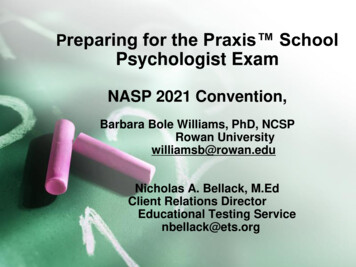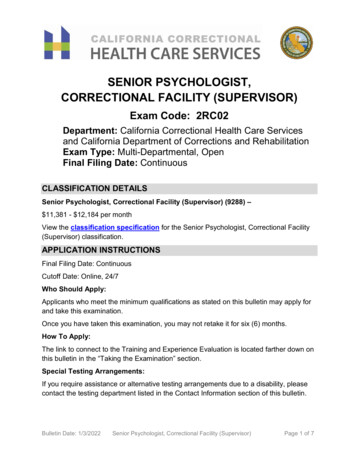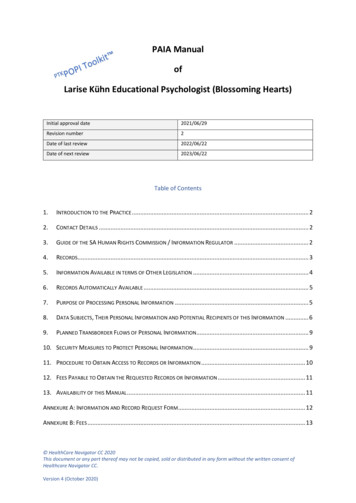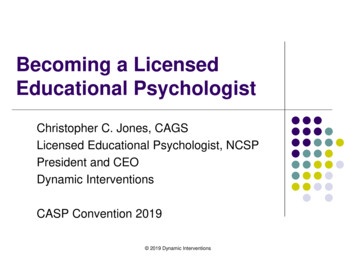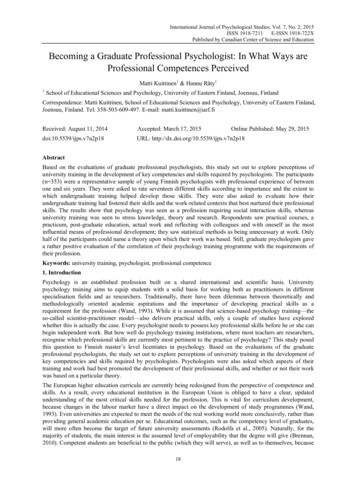
Transcription
International Journal of Psychological Studies; Vol. 7, No. 2; 2015ISSN 1918-7211E-ISSN 1918-722XPublished by Canadian Center of Science and EducationBecoming a Graduate Professional Psychologist: In What Ways areProfessional Competences PerceivedMatti Kuittinen1 & Hannu Räty11School of Educational Sciences and Psychology, University of Eastern Finland, Joensuu, FinlandCorrespondence: Matti Kuittinen, School of Educational Sciences and Psychology, University of Eastern Finland,Joensuu, Finland. Tel: 358-503-609-497. E-mail: matti.kuittinen@uef.fiReceived: August 11, 2014Accepted: March 17, 2015Online Published: May 29, 2015doi:10.5539/ijps.v7n2p18URL: d on the evaluations of graduate professional psychologists, this study set out to explore perceptions ofuniversity training in the development of key competencies and skills required by psychologists. The participants(n 353) were a representative sample of young Finnish psychologists with professional experience of betweenone and six years. They were asked to rate seventeen different skills according to importance and the extent towhich undergraduate training helped develop those skills. They were also asked to evaluate how theirundergraduate training had fostered their skills and the work-related contexts that best nurtured their professionalskills. The results show that psychology was seen as a profession requiring social interaction skills, whereasuniversity training was seen to stress knowledge, theory and research. Respondents saw practical courses, apracticum, post-graduate education, actual work and reflecting with colleagues and with oneself as the mostinfluential means of professional development; they saw statistical methods as being unnecessary at work. Onlyhalf of the participants could name a theory upon which their work was based. Still, graduate psychologists gavea rather positive evaluation of the correlation of their psychology training programme with the requirements oftheir profession.Keywords: university training, psychologist, professional competence1. IntroductionPsychology is an established profession built on a shared international and scientific basis. Universitypsychology training aims to equip students with a solid basis for working both as practitioners in differentspecialisation fields and as researchers. Traditionally, there have been dilemmas between theoretically andmethodologically oriented academic aspirations and the importance of developing practical skills as arequirement for the profession (Wand, 1993). While it is assumed that science-based psychology training—theso-called scientist-practitioner model—also delivers practical skills, only a couple of studies have exploredwhether this is actually the case. Every psychologist needs to possess key professional skills before he or she canbegin independent work. But how well do psychology training institutions, where most teachers are researchers,recognise which professional skills are currently most pertinent to the practice of psychology? This study posedthis question to Finnish master’s level licentiates in psychology. Based on the evaluations of the graduateprofessional psychologists, the study set out to explore perceptions of university training in the development ofkey competencies and skills required by psychologists. Psychologists were also asked which aspects of theirtraining and work had best promoted the development of their professional skills, and whether or not their workwas based on a particular theory.The European higher education curricula are currently being redesigned from the perspective of competence andskills. As a result, every educational institution in the European Union is obliged to have a clear, updatedunderstanding of the most critical skills needed for the profession. This is vital for curriculum development,because changes in the labour market have a direct impact on the development of study programmes (Wand,1993). Even universities are expected to meet the needs of the real working world more conclusively, rather thanproviding general academic education per se. Educational outcomes, such as the competency level of graduates,will more often become the target of future university assessments (Rodolfa et al., 2005). Naturally, for themajority of students, the main interest is the assumed level of employability that the degree will give (Brennan,2010). Competent students are beneficial to the public (which they will serve), as well as to themselves, because18
www.ccsenet.org/ijpsInternational Journal of Psychological StudiesVol. 7, No. 2; 2015they will better understand their learning goals and will be able to take more accountability for their own training(Hatcher et al., 2013).The span of psychological practice is expanding, which further stresses the importance of work-relevant skillsacquirements (Elman & Forrest, 2007; Kaslow, 2004). Stark-Wroblewski et al. (2006, p. 276) observed, however,that undergraduate psychology students have limited information regarding the varieties of professional careersin psychology that exist, besides traditional areas such as clinical and counselling psychology. An introductorycourse on professional issues therefore has proved to be most valuable for psychology students’ career planning(Roscoe & Strapp, 2009). Naturally, having practical experience working as a psychologist is the most importantsource of information for career plans. Carless and Prodan (2003) found that students who had broad practicumtraining experience had much greater clarity in terms of their vocational preferences compared to those with nosuch practicum training. Billett (2008) argued that students expect that their professional training will consist ofauthentic work experiences instead of strictly theoretical training. Students also need to be adept at learningwhen they are at work, since the development of dispositional, procedural and conceptual capacities are requiredin order to achieve a good level of work performance (Billett, 2008). Students may have an unrealistic fantasy oftheir potential as future professionals, which will become more realistic as they witness the realities of work atan early stage (Bruss & Kopala, 1993).Professional university graduate programmes seek to create a close relationship between theory and practice.This can be implemented in two ways: by integrating them directly, or by creating a linear relation by firstteaching the theory, which then will be followed by practical implementations. It is typical in all Finnishpsychology master’s programmes that theories and research methods are taught first during bachelor’s degreestudies; the practice-orientated studies are not taught until the master’s phase. Psychology students must alsounderstand the ethical and social challenges of their field, as well as their responsibilities to clients and to society(Karseth & Solbrekke, 2006, p. 152). Bruss and Kopala (1993) emphasised that in addition to adding knowledge,the development of a professional identity is a necessary aspect of training, and it requires a study environmentbased on closeness and trust.Psychology is taught at six universities in Finland, and is among the most popular fields of study; employmentprospects are also very good for graduates. There are general national guidelines for both the curriculum andexaminations, but the teaching content varies locally. The Finnish psychology curriculum is a 5.5-year generalistmaster’s programme with a five-month practicum that prepares licentiate psychologists to work in severalspecialty areas with little additional training. Graduate psychologists can apply for complementary trainingprogrammes in specialty areas, such as therapy or neuropsychology. The idea behind the curriculum is thatpsychologists are taught generic skills that can then be applied in any domain. Students gain practical experienceonly in one specialty area of psychology during their five-month-long practicum. A graduate student is expectedto be able to work independently after graduating, and the national licensing authority, Valvira, grantspsychologists’ licenses. In these respects, Finnish psychology training is rather similar to its German counterpart(Hodapp & Langfeldt, 2006).Despite this, there are hardly any studies on the relevance of the psychology curriculum from the viewpoint ofpsychologists working in real-world situations, although some studies on student curriculum preferences havebeen conducted. For example, Finney et al. (1989, p. 175) asked psychology students to evaluate the role of thepsychology curriculum in developing their skills. The students stressed the development of written, oral andcritical evaluation skills the most; they mentioned test-taking skills and managerial and organisational skills asthe next three most important skills. The students felt that hands-on experience should be increased in thepsychology curriculum and, interestingly, that coverage of theoretical issues should be decreased. Students feltthat psychology studies had been valuable for their daily life issues, such as enhancing their social relationshipsat home and at work.1.1 Specific Skills Needed in an Expert ProfessionIn seeking to identify the set of skills needed for a profession, it is important to remember the fundamental natureof all professional work. The actual work of the psychologist is that of an archetypal expert profession, in thesense that daily practice involves analysing and resolving tasks and problems that lack any stable or assuredsolutions since they are, by nature, intangible and ill-defined. Consequently, when meeting a new client, the firsttask of a psychologist is to try to specify and verbalise the core of the client’s psychological problem, after whichfurther acts can be planned. A psychologist cannot yet work on following guidelines from a scientifically testedmanual that would offer solutions for solving psychological problems. This is because human behaviour isguided by complex biopsychosocial mechanisms, of which the science of psychology has as yet a rather limited19
www.ccsenet.org/ijpsInternational Journal of Psychological StudiesVol. 7, No. 2; 2015understanding (Bandura, 2001). Orton and Weick (1990) conceived the notion of “causal indeterminacy” to referto uncertain means-ends relations that are a central feature of the work of expert professionals in severaldiscipline, such as teaching, consulting and psychology. To our knowledge, there are no unambiguous,scientifically confirmed interventions that can secure the expected result of resolving a client’s psychologicalproblem. Thus, the outcomes of all interventions are determined only after they have been tested in practice. Inaddition, various resolutions (i.e. therapy forms) can lead to the same effect (healing), resting on the client’sdistinctive life condition and, in particular, the quality of rapport with the psychologist. As an alternative to asmall number of effective therapies, there are, to date, 166 different psychotherapies from which to select. Manynew therapies, including therapies based on art, dance, music and adventure, are being developed all the time.Professional psychologists are thus forced to solve their clients’ problems by testing certain interventions thatthey are familiar with, including the use of creativity and imagination. This aptitude can be called “flexpertise”.Furthermore, the puzzles that clients bring to the table are distinctive and complex, which means thatpsychologists must adapt to endlessly changing situations (Alvesson, 1993).A review of these issues suggests that it is plausible that there are no consistent and rigorous approaches forassessing the multifaceted competences and skills needed in an expert profession. For this reason, it is onlypossible to estimate a few easily measurable skills and areas of knowledge (Kaslow, 2004, p. 779). The use ofone’s “tacit knowledge”, intuition and personal experience are, to a substantial degree, important in theprofession (Bruss & Kopala, 1993), yet they cannot be fully identified or verbalised, let alone quantified orinstructed. Svensson (1990) interviewed psychologists and asked them how and when they used psychologytheories in their actual daily work. He observed that they had clear difficulties in providing explicit illustrations.It is also worth noting that psychology, like all behavioural sciences, has been sub-divided into many sub-fields,because there are several theoretical and methodological schools of thought specialising in their particularresearch agendas (Wand, 1993). A psychologist working in the field therefore must choose from the differenttheories and approaches to guide his or her work (Karseth & Solbrekke, 2006, p. 156). This is a major challenge,and only a few psychologists lean on a specific theory. Moreover, half of the graduate students surveyed by Perland Kahn (1983, p. 143) stated that their preferred theoretical method was eclectic, borrowing from severaltheories. Pelling (2007, p. 219) confirmed this finding after studying counselling psychology in Australia. Asimilar trend was also evident in our study sample.While scientific theories and formal knowledge only offer a small part of the professional knowledge thatpsychologists need to help solve their clients’ problems, they offer a solid basis for professional developmentduring one’s career. Still, uniqueness, volatility, complication and ambiguity are always present in actual workpractice. Although the immediate connection between work practice and scientific knowledge is open tocriticism, science-based academic education provides power and prestige to a profession, and every professionhas a desire to sustain its independence, reputation and jurisdiction (Wand, 1993). For this reason, bothprofessionals and academic faculty members want to sustain academic values, and they need research institutionsfor their professional education (Karseth & Solbrekke, 2006, p. 163).In the most favourable cases, the skills required in a profession like psychology evolve from the outset of one’scareer, which makes efforts to outline professional skills even more intricate. The majority of professionalpsychologists obtain new qualifications after graduation; in countries such as Finland this is even expected, sinceformal psychology education provides no specialisation. Informal work-based learning promotes intentional orunintentional scholarship. Intentional learning endeavours, such as acquiring a new therapy technique, are morestraightforward to investigate, illustrate and distinguish from one another. Unintentional learning, on the otherhand, can happen under several conditions, such as during an exchange of ideas on problematic cases betweenco-workers, or from receiving feedback from co-workers (Berg & Chyung, 2008). Skills can degrade over time ifpsychologists do not keep up with the newest developments in their field, and regularly work to update theirknowledge in response to these developments. Professional skills are specific to certain areas of specialisation,such as neuropsychology; highly developed expertise thus can only be achieved in a limited area of knowledge(Barnett et al., 2007).It is noteworthy to include the ongoing discussion on the origin of skills. The question is whether professionalskills can be taught to everyone, or if they are innate and can be further nurtured during the training phase toreach an expert level. On the basis of the above discussion, it is interesting to delve into the development ofprofessional skills as described by graduate psychologists themselves.20
www.ccsenet.org/ijpsInternational Journal of Psychological StudiesVol. 7, No. 2; 20151.2 Definitions of Psychology SkillsSeveral different endeavours around the world have aimed to coherently outline the skills required by thepsychology profession. The American Psychological Association (APA) Competencies Conference constructedthe first consistent competence description for psychology by 130 attending psychologists (Kaslow et al., 2004).At this conference, it was determined that the following areas relating to values, mindsets and knowledge werecentral to professional psychologists working in health and human services. These are: (a) research methods andscientific bases of psychology; (b) ethical, legal and public policy issues; (c) professional development issues; (d)psychological assessment; (e) intervention; (f) individual and cultural diversity; (g) consultation andinterdisciplinary relationships and (h) supervision.Rodolfa et al. (2005) further developed this categorisation with an exploratory cube model consisting of thefollowing components: functional and foundational competencies added to the stage of professional maturity,and ranging from the undergraduate level to the doctoral stage. “Foundational competencies” refer to whatpsychologists do in reality. They are labelled: (a) scientific knowledge/methods, (b) reflectivepractice/self-assessment, (c) relationships, (d) individual/cultural diversity, (e) ethical/legal standards/policy and(f) interdisciplinary systems. These aptitudes are learnt during graduate studies. “Functional competency”portrays the spheres of a psychologist’s professional functioning. These competences are composed of: (a)research/evaluation, (b) intervention, (c) supervision/teaching, (d) assessment/diagnosis/case conceptualisation,(e) consultation and (f) management/administration. Further, Rodolfa et al. (2005) offered a comprehensivecharacterisation of each competency domain.The Finnish Psychological Association has proposed the key elements of the work of a psychologist as follows:intervention, training, publishing, psychological assessment, work development and administration (Näätänen etal., 2008). EuroPsy is a European standard of professional training and psychology education. A EuroPsycertificate is granted to a candidate who can master these competences: definition of the objective,communication, psychological assessment, development, intervention, self-assessment and activities thatpromote competence growth (http://www.efpa.eu). The representatives of the Australian educational psychologyinstitutions, together with members of the Australian Psychological Society (APS), grouped the competencesunder the following headings: professional, legal and ethical approach; measuring and solving problems;discipline knowledge; influence and change research; framing, professional and community relationship; andservice implementation and communication (Garton, 2006). In Canada, qualified psychologists are required to beequipped in the following psychology competency areas: (a) research, (b) intervention and consultation, (c)assessment and evaluation, (d) ethics and standards and (e) interpersonal relations (Rodolfa et al., 2005).Putting together these categorisations, the most generic skills are consultation, psychological assessment,intervention, professional growth, scientific fundamentals of psychology, legal and ethical issues andinterdisciplinary interactions. These classifications are, however, limited, since they are relative hypotheticalportrayals of skills that are obviously arduous to make operational for appraisal purposes. Our study set out tobuild a simple instrument to evaluate basic skills that are learnt in (and demanded from) professional psychologywork practice. We chose the self-assessment technique to assess these skills (Kaslow, 2004). First, we explorednumerous surveys validated by our universities in their alumni feedback research for appraising generalacademic skills taught at university. Second, we meticulously chose the key skills that are most relevant inprofessional psychology when assessed against the major psychology competency descriptions. Following this,the selected statements were sent for examination to every psychology department in Finland, as well as to tensenior professional psychologists; very few (and minor) changes were suggested.This study concentrates on the following research problems, as perceived by graduate psychologists:(1) How does the university training of psychologists respond to the skills needed at work?1) In which areas is university education seen to provide good work-related skills?2) In which areas is education seen to fail to provide sufficient skills for psychology work?(2) How do psychologists perceive the role of theoretical training, work, continuing education and reflection inenhancing their professional skills? Is their work based on a particular theory?(3) Which undergraduate courses and aspects of training are seen to promote best the development of yourprofessional skills?21
www.ccsenet.org/ijpsInternational Journal of Psychological StudiesVol. 7, No. 2; 20151.3 ParticipantsIn the autumn of 2008, an e-mail was sent to every Finnish psychologist who graduated between 2002 and 2007,totalling 1,193 people. The e-mail asked the recipients to fill in a questionnaire via a given web address. Areminder was posted after two weeks. The response rate was 30 percent (N 353). A great majority of theparticipants were female (91 percent), which is in accordance with the general gender distribution ofpsychologists. The mean age of the participants was 33 years (SD 4.7); 88 percent were under 36 years of age.The number of respondents who graduated in each of the six years varied between 46 and 74. The vast majorityof participants (90 percent) worked in the public sector, and nine out of ten had obtained their positions withinthree months of graduation.1.4 QuestionnaireThe questionnaire instructions read, “How important are the following knowledge areas and skills to yourcurrent job? Also assess how well your university training developed these skills”. The participants werepresented with seventeen skill-related statements (see Figure 1) and were asked to evaluate them twice—first, interms of how important they were to the profession, and second, the extent to which their undergraduate traininghelped develop them. A five-point Likert-type scale was used, which consisted of the following options: (1)“very poorly”, (2) “poorly”, (3) “satisfactorily”, (4) “very well” and (5) “excellently”.In addition, the psychologists were asked to respond to five statements relating to the meaning and importance ofuniversity training, actual work experience, further education, self-reflection and reflection with colleagues ontheir own professional skills development. To ensure full coverage of the survey, an additional three openquestions were presented: (i) whether their work was based on a particular theory, and if so, to name it; (ii)which undergraduate courses and aspects of their work had been most beneficial for their professional skillsdevelopment; and (iii) they were further asked about the occasions during their career during which they hadlearnt the best new skills, although this data was not analysed here. Only one respondent was unable to identifyany specific, professionally beneficial undergraduate course. These items therefore produced rich data.2. Data AnalysisThe quantitative ratings and written statements were analysed separately. The analyses were conducted usingIBM Statistical Package for the Social Sciences (SPSS) statistics 21. Differences between the psychologists’conceptions of how university training developed certain skills and the precise meaning of these skills at workwere analysed with the Wilcoxon matched pairs signed-ranks test. The relation between university training andwork-related learning was analysed using non-parametric (Spearman’s rho) correlations. The connectionbetween theoretical work orientation and work experience was analysed with the χ2 test, in which the effect sizewas measured with Cramer’s V test. Due to the low number of male psychologists and the large variety ofspecialisation areas, the comparisons were only performed against the above-mentioned variables.The written statements were analysed following Braun and Clarke’s (2006) six phases of conducting thematicanalyses. First, the themes were inductively discovered and elaborated with a “bottom-up” or grounded theoryanalytic process by systematically grouping together statements based on their similar semantic meanings. Thiswas continued until distinctive, coherent and consistent themes were identified. We then went back to the rawdata and grouped all responses into these themes. Themes are patterned responses or meanings which bothminimally organise and best describe the dataset in its richness. This allows theoretical interpretations of itsvarious aspects by relying both on their content and their frequency of occurrence (Braun & Clarke, 2006, pp.79-82). The analysis sought to understand the multiple meanings that psychologists gave to their studyexperiences and professional development in a transparent and credible way.3. Results3.1 Correlation of University Training with Professional NeedsFigure 1 demonstrates the striking differences between the skills needed at work and those learnt in university.Statistical difference comparisons indicated that for all skills except information acquiring skills, the differencewas statistically significant (Wilcoxon matched pairs signed-ranks test p .05). University training was seenmostly to have promoted scientific skills, such as research, information acquisition and the understanding oftheories in psychology. Knowledge about assessment methods and their scientific basis, as well as analytical andsystematic thinking skills, were seen as having been well developed during the graduate training. These skillswere also evaluated as having been valuable in the psychology work context. Respondents found that managerialskills had not been taught, nor were they needed by psychologists.22
www.ccsenet.org/ijpsInternational Journal of Psychological StudiesVol. 7, No. 2; 2015Figure 1. Psychologists’ mean ratings of skills learnt at university vs. those needed at workOn the subject of other skills, several striking differences emerged, in particular, in the area of social skills.According to psychologists, their work was most of all about social interaction with clients, where negotiation,problem identification and solving, intervention planning and implementation skills and networking expertisewere most needed. Knowledge about legislation, how to put clients’ data on record and education and trainingskills were also seen as being very valuable in the work practice of psychologists. Organisation and coordinationskills, along with the capacity to act when faced with ethical dilemmas, were also required at work. In all ofthese key skills, university training was seen as failing to react appropriately to the changing needs of theprofession; therefore, the respondents deemed the correlation of the curriculum with real-world work tasks to bevery low.3.2 Important Learning Contexts for Professional SkillsWe now review the learning contexts for professional skills. Table 1 indicates that practical work tasks and thework context were evaluated as being the most effective for professional skills growth. The importance ofcolleagues is striking, since reflection and dialogue with them were seen as vital for learning professional skills.Self-reflection and in-service training were the next two most influential means of skills development. The roleof graduate training was seen as moderately positive but was less important when compared with other measuredwork-based learning context variables (Wilcoxon match pairs signed-ranks test p 0.001). These variablescorrelated slightly negatively, emphasising their divergence.Table 1. The means and inter-correlations of the statements on professional developmentNon-parametric/Spearman’s rho/CorrelationsStatement of professional skillsM (SD)1.2.3.1. Master’s degree provided good professional skills3.43 (.95)2. Postgraduate and in-service training have been useful4.42 (.78).073. Only practical work has developed my professional skills4.68 (.56)–.21*.074. Reflection with colleagues has developed my professional skills4.69 (.52).02.07.14*5. Self-reflection has developed my professional skills4.46 (.58)-.02.10.14*Note. *p .01 (two-tailed)234.29*
www.ccsenet.org/ijpsInternational Journal of Psychological StudiesVol. 7, No. 2; 20153.3 The Role of Psychological Theories at WorkWe now examine the responses to the open-ended questions. First, the role of theory was elucidated by askingthe respondents whether their work was based on a particular theory or theories, and if so to identify theories onwhich they drew during the course of their work. Responses were placed into two groups according to workexperience. The results are shown in Table 2. As in previous research, half of the respondents could name atheory they followed in their work, and those who did mentioned eclectic uses of theories or referred mostly tocognitive theory. No consistent trend emerged in terms of the frequency of theory use. There were differencesonly within groups with one, four and six years of work experience (χ2 [5] 13,538, p .02, V .196).Table 2. Responses to the question of whether work was based on any specific theory in accordance with actualwork experienceWork experience in yearsNo theories mentioned n (%)Theory or theories mentioned n (%) Total138 (61%)**24 (39%)**62227 (48%)29 (52%)56332 (43%)42 (57%)74422 (34%)**43 (66%)**65520 (44%)26 (56%)46630 (60%)**20 (40%)**50Total169 (48%)184 (52%)353Note. **p .05 difference between “No theories mentioned” and “Theory mentioned” groups3.4 The Most Influential Undergraduate Courses for Learning Professional ExpertiseThe following thematic analysis is based on respondents’ written comments on their undergraduate learningexperiences. Most comments included content on numerous themes; thus, they were rigorously classified undereach corresponding theme, for a total of 844 classified items.Tab
Becoming a Graduate Professional Psychologist: In What Ways are Professional Competences Perceived Matti Kuittinen1 & Hannu Räty1 1 School of Educational Sciences and Psychology, University of Eastern Finland, Joensuu, Finland Correspondence: Matti Kuittinen, School of Educational Sciences and Psychology, University of Eastern Finland,
